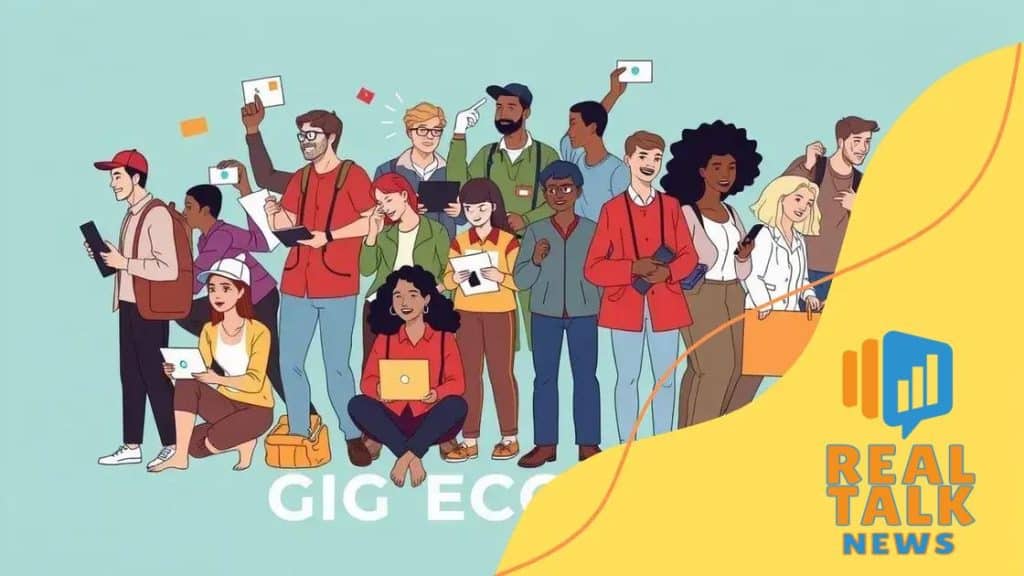Expanding benefits for gig economy workers in 2025

Expanding benefits for gig economy workers in 2025 includes improved access to health insurance, unemployment support, and regulatory protections, addressing the unique challenges faced by freelancers.
Expanding benefits for gig economy workers in 2025 is a crucial topic, especially as more people are entering this flexible workforce. Have you wondered how these changes might improve job security and work-life balance? Let’s dive into the evolving landscape!
Understanding the gig economy landscape
The gig economy has grown rapidly over the last few years, changing how many people think about work. More individuals are taking on freelance jobs or short-term contracts, creating a diverse and dynamic workforce.
Understanding the gig economy landscape is essential to grasp its implications for workers and employers. One notable aspect is how technology enables this shift. Today, platforms like rideshare services and freelance marketplaces allow individuals to connect with clients and earn income flexibly.
Characteristics of the gig economy
Gig work differs from traditional jobs in several key ways. Here are some defining features:
- Flexibility: Workers can often choose their hours, making it easier to balance personal commitments.
- Diversity of work: From driving to graphic design, gig roles span various sectors.
- Independent income: Many gig workers rely on multiple sources of income, reducing dependence on a single employer.
- Skill development: Freelancers can often enhance their skills while working on different projects.
As more people join the gig economy, they encounter both opportunities and challenges. One major benefit is the ability to create a customized work-life balance that suits individual needs.
However, gig workers also face uncertainties, such as lack of benefits and job security. Recognizing these challenges is crucial for stakeholders aiming to support gig workers in the future. The evolution of state policies and employer practices will significantly impact the availability of resources for these workers.
Understanding the gig economy landscape helps everyone involved identify what’s needed to improve the experience for everyone contributing to this vibrant sector.
Key benefits emerging in 2025
The year 2025 is set to bring significant advantages for gig economy workers. These benefits address many challenges that freelancers have faced in the past, paving the way for a more secure future.
One key aspect is the expected improvements in healthcare access. Many companies are beginning to offer affordable health insurance plans tailored specifically for gig workers. This change is crucial, as it ensures that freelancers can access necessary medical services without overwhelming costs.
Financial support systems
Another significant benefit is the introduction of financial support systems. These systems can help gig workers during tough times, offering:
- Unemployment benefits: Providing a safety net for workers between gigs.
- Retirement plans: Facilitating long-term savings for freelancers.
- Micro-loans: Allowing easy access to funds for personal or business needs.
These enhancements not only foster a sense of security but also empower gig workers to thrive in an uncertain job market.
Moreover, advancements in technology will lead to better tools and resources for freelancers. Improved platforms will make it easier for gig workers to find jobs that match their skills and preferences. Online communities will also grow, helping workers network and share valuable tips.
As 2025 approaches, the focus on enhancing job quality for gig workers is becoming clearer. Companies and governments are starting to recognize the importance of ensuring a vibrant and supportive gig economy.
How technology reshapes worker benefits

Technology is significantly reshaping how benefits are delivered to gig economy workers. Innovations in the digital space make accessing and managing benefits easier than ever.
Online platforms and apps are becoming central to the gig experience. These tools provide essential resources and create opportunities for workers to access support. For example, mobile applications can help freelancers track their income and expenses, simplifying financial management.
Innovative solutions for benefits
Emerging technologies are also paving the way for new benefits systems. Some notable advancements include:
- Health and wellness apps: These offer health tracking, virtual doctor visits, and access to mental health resources.
- Automated savings tools: These help workers set aside funds for taxes or retirement effortlessly.
- Job platforms: Some platforms provide built-in benefits like paid time off, insurance, and retirement plans.
As connectivity improves, the potential for gig workers to receive additional perks grows. Workers can now find jobs specifically tailored to their needs through platforms that prioritize their interests and skill sets.
Additionally, technology enhances the ability of gig workers to negotiate their terms. Online communities allow them to share experiences and strategies, fostering collaboration and empowerment. This sense of community can lead to better working conditions and increased benefits across various gig sectors.
The fusion of technology and worker benefits is making a notable impact on the gig economy. As advancements continue to unfold, we can expect to see even more innovations that enhance the worker experience.
Personal stories from gig economy workers
Personal stories from gig economy workers reveal the diversity and resilience of this workforce. Each worker has a unique journey, reflecting the challenges they face and the rewards they earn.
Many gig workers share experiences of flexibility that traditional jobs often lack. For example, a single parent might choose to drive for a rideshare service to manage their schedule around childcare. This independence allows them to earn money while still being present at home.
Overcoming challenges
However, gig work does not come without struggles. Workers often face:
- Income instability: Earnings can fluctuate significantly from week to week.
- Lack of benefits: Many gig workers do not receive health insurance or retirement savings plans.
- Isolation: The nature of freelance work can lead to feelings of loneliness.
These challenges push gig workers to find creative solutions. Some join online communities to connect with others, sharing tips and encouragement. Others develop multiple streams of income to offset unpredictability.
Positive stories also highlight the benefits of gig work. One worker may share how they turned a hobby into a profitable venture through online marketplaces. Another might explain how gig work provided the means to travel and explore new opportunities.
These narratives illustrate the growing significance of the gig economy in people’s lives. Each story underlines the importance of providing support and resources to ensure the success of gig workers as they navigate their unique paths.
Policy changes impacting gig workers
Policy changes impacting gig workers are crucial in shaping their working conditions and access to benefits. As the gig economy grows, governments around the world are beginning to recognize the need for policies that support these workers.
One significant trend is the push for regulations that ensure fair pay. Many gig workers struggle with inconsistent income, which has prompted lawmakers to consider laws that mandate minimum wage standards and transparent payment practices. This push aims to create a more balanced playing field for freelancers.
Benefits and protections
Alongside fair pay, there are discussions about providing essential benefits and protections. These may include:
- Health insurance: Policies are being proposed that would grant gig workers access to affordable health care coverage.
- Unemployment benefits: Some states are considering providing safety nets for gig workers who lose work unexpectedly.
- Workers’ compensation: New laws might ensure that freelancers are compensated for on-the-job injuries.
These changes are part of a broader movement to recognize gig work as a valid employment model. As policymakers become more aware of the unique needs of gig workers, regulations are slowly but surely evolving.
Furthermore, local governments are also exploring options for portable benefits—benefits that workers carry with them from job to job. This approach helps gig workers maintain health coverage and retirement savings even if they switch platforms frequently.
As the landscape shifts, it’s essential for gig workers to stay informed about these developments. Changes in policies can directly affect their livelihoods and the stability of their work environments.
FAQ – Frequently Asked Questions about Gig Economy Workers
What benefits can gig economy workers expect in the future?
In the future, gig economy workers can expect benefits such as health insurance, unemployment support, and retirement plans as policymakers recognize their needs.
How does technology support gig economy workers?
Technology provides gig workers with tools for tracking income, managing finances, and finding jobs, enhancing their overall work experience.
What challenges do gig workers face today?
Gig workers often face challenges like income instability, lack of benefits, and feelings of isolation, making supportive policies increasingly important.
How can gig workers stay informed about policy changes?
Gig workers can stay informed by following industry news, engaging with online communities, and participating in discussions about labor rights and benefits.





